- Summertime Summertime/I Love Her Still (Decca F 11718) 1963
- Caroline/If You Don't Want Me Now (Decca F 11809) 1964
- I Like The Look Of You/Come On Girl (Decca F 11912) 1964
- Look Homeward Angel/I'll Have My Tears To Remind Me (Decca F 11985) 1964
- You've Got Your Troubles/I've Got To Go (Decca F 12173) 1965 (2)
- Here It Comes Again/Things I Should Have Known (Decca F 12243) 1965 (4)
- This Golden Ring/Someone To Care (Decca F 12321) 1966 (15)
- You Gave Me Somebody To Love/Silent Street (Decca F 12429) 1966
- Is It Really Worth Your While?/Am I Losing My Touch (Decca F 12485) 1966
- Gone From My Mind/Silent Street (London Press 60001) 1966
- Our Love Has Gone/Truly Yours (Decca F 12612) 1967
- The Idol/His Smile Was A Lie (United Artists UA 1188) 1967
- Loving Cup/An Hour At The Movies (United Artists UA 2218) 1968
- Seasons In The Sun/Louise (United Artists UA 2239) 1968
- Sunday Night/Just Another Dream (United Artists UA 25704) 1969
- Ballad Of The Alamo/Save A Little Dream (United Artists UA 35027) 1969
- Fire Brigade/Painting A Shadow (United Artists UA 50280) 1969 (released in U.S.A. only)
- That Same Old Feeling/Lifetime Of Love (World Pacific 77937) 1969
- Books And Films/Sad Sad Sad (United Artists UP 35054) 1970
- Here Comes That Rainy Day Feeling/Bad Side Of Town (Capitol CL 15671) 1971
- Freedom Come, Freedom Go/There's A Man (Capitol CL 15693) 1971 (6)
- Storm In A Teacup/I'm Not Following You (Capitol CL 15707) 1972 (7)
- The Fortunes (Decca LK 4736) 1965
- Seasons In The Sun (United Artists UA S-5021) 1969
- That Same Old Feeling (World Pacific WPS 21904) 1969
- It's The Real Thing (Coca Cola Publishing) 1969
The Fortunes
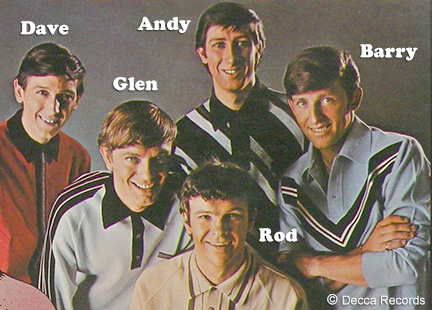
BIRMINGHAM
Revised January 2023
Rod Allen (Rodney Bainbridge) vocal, bass guitar
Glen Dale (Richard Garforth) vocal, guitar (left 1966)
Barry Pritchard vocal, lead guitar, keyboard
Andy Brown drums
David Carr piano, organ, vocal (left 1968)
Shel Macrae (Andrew Semple) guitar, vocal (joined 1966)
George McAllister keyboards, vocal (joined 1971)
This internationally successful group originating in Birmingham contributed their incredible vocal harmonies to some of the most melodic and enduring pop songs recorded during the 1960s and 70s. Discovered by pioneering pop music promoter Reg Calvert, The Fortunes were also to showcase the talents of hit songwriting team Roger Greenaway and Roger Cook.
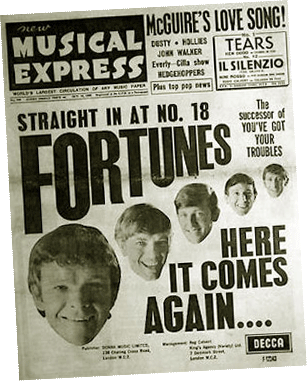
"You've Got Your Troubles"
The Fortunes story begins in 1960 when Moseley Grammar School pupils Rodney Bainbridge (born 31 March 1944) and Barry Pritchard (born 3 April 1944) formed a singing duo known at the time as "The Strollers". They were later joined by drummer Leigh Clark and bass guitarist Mick Tomlinson with whom they performed a number of times at The Shirley Institute and the Co-op Hall in Nuneaton.
It was early in 1963 when The Strollers were spotted by innovative pop music promoter and "pirate radio" pioneer Reginald Calvert who along with his wife Dorothy, saw potential in Rodney and Barry. Reg invited them to live on his estate at Clifton Hall near Rugby.
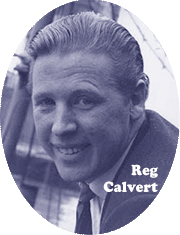
Clifton Hall was to become something of a school for would-be pop stars in the early 1960s with Reg Calvert discoveries such as "Johnny Washington", "Danny Storm", "Buddy Britten" and "Robbie Hood" already being groomed for stardom by the time Rodney Bainbridge (now Rod Allen) and Barry Pritchard arrived there. Reg would also go on to manage "Screaming Lord Sutch" and the pop group "Pinkertons Assorted Colours".
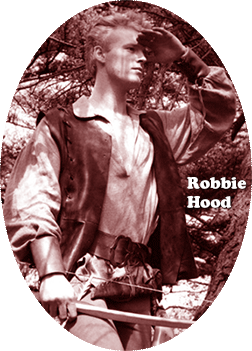
It was Reg's idea that London vocalist Robbie Hood (Mike West) should have his own band of "Merry Men" so Rod and Barry were drafted to provide the appropriate vocal and instrumental backing with Rod Allen now playing an electric bass guitar and Barry with a new Burns electric six-string. Like it or not, they were also kitted out in uniforms of lincoln green that included jerkins, boots, and yes - tights! (another Brum group The Sundowners would also later do time as Robbie Hood's Merry Men).
Fortunately, it wasn't too long before Reg Calvert realized that Rod and Barry (much to their relief!) would be better suited to forming their own group and so paired them with another of his 'discoveries' in the form of aspiring vocalist/guitarist Glen Dale (Richard Garforth) from Kent who was born on 24 April 1943.
Reg Calvert had sixteen year old Johnny Washington fronting the group initially. John had already recorded a couple of singles in 1961 as a budding "teen idol" but left the line-up to continue his own career when Glen Dale joined and eventually became vocalist for Birmingham hit group The Applejacks. The trio of Glen, Rod, and Barry soon found their main strength lay in the three-part harmonies which they expertly developed to form the trademark sound that would make them famous.
"Reg held competitions and, if people shouted a number that we couldn't do, he would pay them half-a-crown"
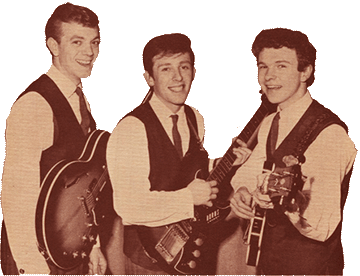
Launched by Reg Calvert as "The Cliftones" (in reference to Clifton Hall), the trio proved to be a successful live act. Barry Pritchard recalled; "Reg held competitions and, if people shouted a number that we couldn't do, he would pay them half-a-crown. It was no big deal. There might be twenty people shouting out, so Reg would only pick out numbers that we knew!"
Around this time, drummer Andy Brown (born July 7, 1946 and previously with a West Midlands band called The Lawmen) along with keyboard player David Carr (born 4 August 1943, Essex) were added to the line-up.
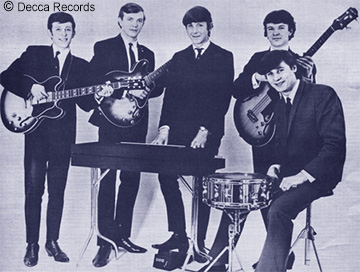
Re-named "The Fortunes Rhythm Group", the now five-piece band won first place at a beat contest held at Edgbaston's 'Gay Tower Ballroom'. The group projected a clean, well dressed image on stage and encouraged by manager Reg Calvert, included covers of Dionne Warwick, Gene Pitney and Broadway show songs into their repertoire.
NOTE: this is NOT the same Fortunes group who recorded a track for the DIAL "Brum Beat" LP in 1964. There were a few other bands called "The Fortunes" active in the West Midlands area during the early 1960s.
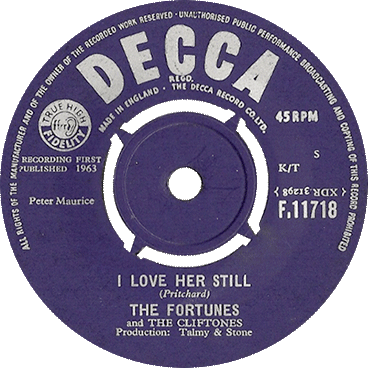
Reg Calvert managed to get The Fortunes signed to the prestigious Decca Records label in late 1963. Their first record release - under supervision of future Who and Kinks producer Shel Talmy - was a rather bizzare cover of "The Jamies" 1958 U.S. hit 'Summertime, Summertime'. This single was also attributed to "The Cliftones". The B-side 'I Love Her Still' was composed by Barry Pritchard.
A second Fortunes single titled 'Caroline' also produced by Shel Talmy along with the B-side 'If You Don't Want Me Now' released the following year was adopted by the pirate radio station "Caroline" as its theme tune. Despite plenty of airplay, the record did not chart and their next single A-side titled 'I Like The Look Of You', although highly competent, was derivative of the current popular "Mersey Sound" made famous by The Beatles. It was probably no coincidence that The Fortunes were one of the bands featured on Decca's 1964 "Live At The Cavern" LP recorded at that legendary venue in Liverpool.
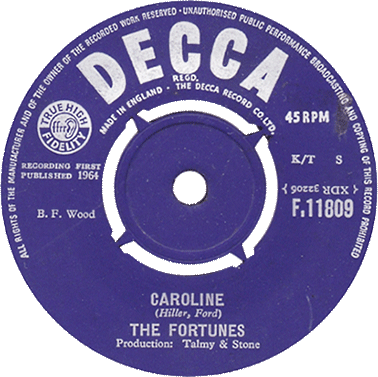
Compositions by group members in those days were usually confined to single B-sides. These included Barry Pritchard's 'Come On Girl' which appeared on the back of The Fortunes third single, and the group composition 'I'll Have My Tears To Remind Me' from their fourth release in 1964.
For the band's next single, Decca tried a different approach. Shel Talmy with assistance from Mike Leander (who was also working with Brum hit group The Applejacks) had The Fortunes cover Johnny Ray's 1957 hit ballad 'Look Homeward Angel' that featured Rod, Glen, and Barry's wonderful harmony vocals over a heavily orchestrated backdrop. The result was an incredible recording that clearly showed the group's potential but unfortunately it also failed to make the charts.
"I wanted to use them as singers backed by professional musicians"
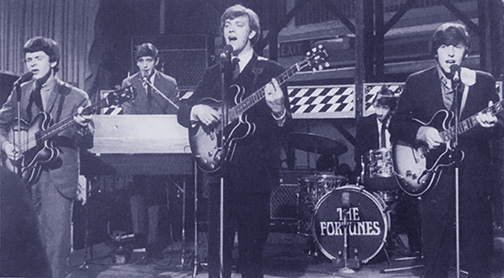
Now with four strikes against them, Decca reluctantly gave the band one last chance. The Fortunes fifth single was a new composition written by then-unknown songwriters Roger Greenaway and Roger Cook. The recording featured lavish instrumentation arranged by Les Reed as well as the now trademark three-part harmonies by the group featuring Rod Allen's lead.
Produced by Noel Walker at Decca he recalled; "The Fortunes contract came up for renewal and Decca didn't want to renew it. I told Decca that they sung wonderfully and deserved another chance. I wanted to use them as singers backed by professional musicians".
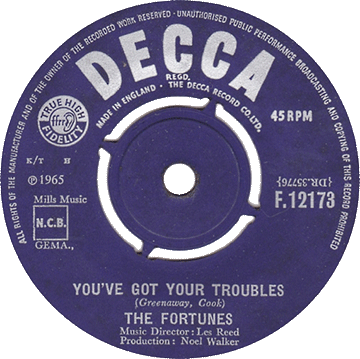
The song titled 'You've Got Your Troubles', suited the band's sound and image perfectly. This record almost reached the top spot in the British charts in August of 1965 and also climbed to a respectable Number 7 in the U.S. charts. The record made it to Number One in Canada and New Zealand.
The composers Greenaway and Cook were initially dismayed to discover that an "unknown" group had recorded their composition but were happy with the record's success and still regard the Fortune's version to be the definitive one. The single's B-side titled 'I've Got To Go' was also very good and featured a lead vocal from Glen Dale.
Roger Greenaway and Roger Cook would also have their own chart success the following year as the singing duo "David and Jonathan" recording a cover of The Beatles 'Michelle' and also having a hit with their own composition 'Lovers Of The World Unite'.
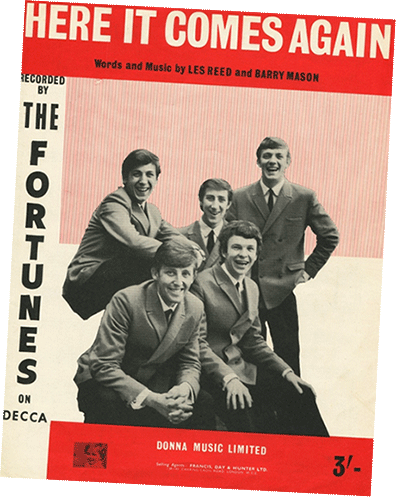
With a hit formula now established, a follow-up, the prophetically titled 'Here It Comes Again' composed by Les Reed and Barry Mason was soon recorded by The Fortunes and released in October as their next 45. This record gained a Number 4 chart placing in both the UK and Canada while also going to Number One in Australia. The Fortunes self-titled first album was issued in 1965 in both the UK and North America.
Rod Allen said; "After 'Troubles' Les Reed and Barry Mason wrote Here It Comes Again especially for us. It even had the chat line in the middle. We couldn't have wished for a better song and it was a top five smash."
Following this success, The Fortunes joined the famous "British Invasion" and went on a promotional tour of the USA in 1966 with "Peter & Gordon" and fellow Brum group The Moody Blues who were enjoying the international success of their hit single 'Go Now'. They, along with American soul star Wilson Pickett, played shows in New York that were followed by dates in Los Angeles.
The New York performances by The Fortunes were for the "Murray The K" TV show where they played twice a night for a week at the Brooklyn Fox Theatre. Murray was the famous radio DJ who was one of the first to promote The Beatles in the US. Rod Allen said; "We did the first two shows without Barry Pritchard. Denny Laine took him out on the town as soon as we arrived and Barry ended up so smashed out of it. Murray the K was none too happy!"
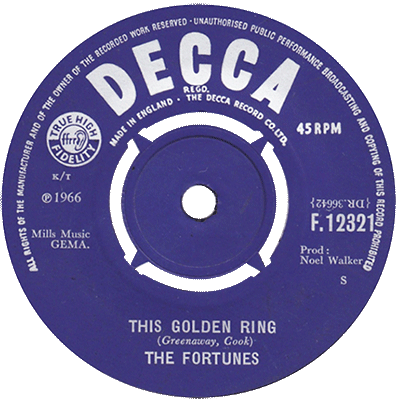
The Fortunes hit records gained them many young fans in both the UK and abroad. While touring in Germany, Belgium and Holland, the group were surprised by some of the reaction. Barry Pritchard said; "We were playing in a bus garage and the promoters hadn't taken enough security precautions. There were security barriers at the front but the crowd just climbed over them and knocked them down. A couple of us got pulled off the stage. The police couldn't do much about it."
Andy Brown recalled a similar event when they performed at the Isle of Wight. "It was the same thing then. The bouncers just weren't enough. We got pulled about and the crowd was out of control. We won't appear there again unless we're certain they've taken adequate security measures."
"We've never tried to conceal the fact that we don't play guitar on our discs"
In early 1966, the Fortunes 7th single 'This Golden Ring' also by Greenaway and Cook was to reach Number 15 in the charts but that year also saw a minor scandal erupt when the group admitted during an interview that top session musicians were responsible for most of the instrumentation on their hit records excepting the vocals. Although this was not an uncommon practice back then or today, it may have damaged the groups' credibility among some of the more "serious" music fans at the time.
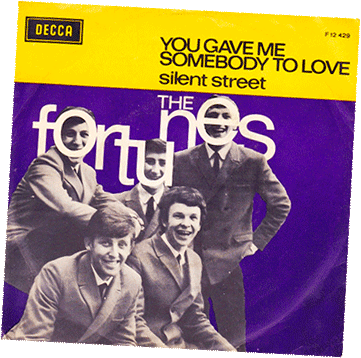
Rod Allen told journalist Keith Altham; "We've never tried to conceal the fact that we don't play guitar on our discs. We use our own drummer and organist plus guitarists like Vick Flick and Jimmy Page. We've always tended to give more attention to vocals, and using session musicians gives us the chance to concentrate on our singing. On stage we all play our own instruments."
A further more tragic blow occurred on June 21, 1966 when The Fortunes manager Reg Calvert who also owned "Radio City", a pirate radio station located in the Thames Estuary, was shot to death by former politician and war hero Major Oliver Smedley at his house during a heated dispute over a business deal. It's not clear if Reg was carrying a weapon at the time.
In the resulting murder trial, Smedley who represented a rival pirate station "Radio Atlanta", entered a plea of self-defense and was found not guilty but the incident and verdict remains controversial to this day.
The Fortunes next few singles had missed the charts despite their commercial appeal and in July 1966, guitarist/vocalist Glen Dale left the group to go solo following a disagreement during one of their recording sessions. With Rod Allen usually selected to sing the lead on their single A-sides, Glen said; "You can put it down as a difference of opinion over policy. I've been in this business for six years as a vocalist and it seemed ridiculous for me to end up just one of a backing group. I just felt I was being squeezed out."
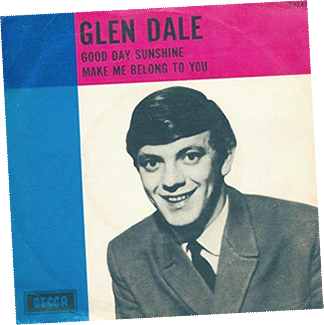
Rod Allen later said; "We knew for some time that Glen was leaving. There were problems and it was getting difficult. He had some personal things and we always put the group first. We couldn't have gone on the way we were." Although retaining his recording contract, Glen's only record release as a solo artist on Decca was a cover of The Beatles 'Good Day Sunshine' that failed to chart after which he seemed to disappear completely. Coincidentally, this single was produced by Tony Clarke who went on to great success working with The Moody Blues.
Glen's place in the group was taken temporarily by Peter Lee Stirling of The Bruisers who recalled; "I'd known Reg Calvert for years as he used to book us when we were the original Beachcombers. The Fortunes were mates from the early days back in Birmingham. I remember doing a few dates down on the south coast and then a couple of shows in Ireland and Scotland with them."
While performing at East Kilbride in Scotland, The Fortunes discovered talented Scottish vocalist/guitarist Shel Macrae who was playing in a group called "The Kimbos". Shel joined The Fortunes officially as Glen Dale's replacement but with the onset of the psychedelic era, the Fortunes' record sales continued to decline. Like fellow Brum pop group The Rockin' Berries before them, The Fortunes soon discovered that plenty of bookings were available on the lucrative "cabaret circuit".
"We were like wet fish on a slab, and it took us some years to get back"
In August of 1967, the Fortunes switched to the United Artists record label and released new singles consisting of self-composed material. The first of these was the excellent track titled 'The Idol' composed by Rod Allen and Barry Pritchard. This change of direction, although promising, did not achieve chart results but the group soon found new success in recording "advertising jingles", most notably 'It's The Real Thing' for Coca-Cola. This, along with regular bookings on the northern club circuit, sustained the band throughout the later 1960s.
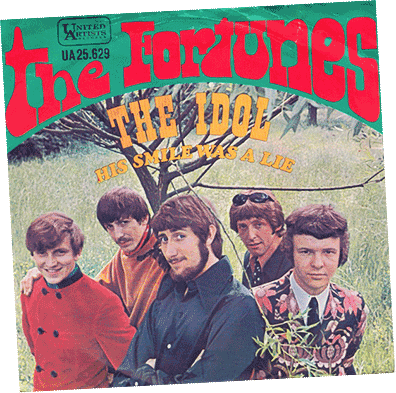
Rod Allen recalled; "We never starved and we never stopped working. We always worked for good money too through doing a lot of cabaret and one-nighters. In between that there's been things like Coca Cola jingles for TV commercials." Barry Pritchard later said; "We were like wet fish on a slab, and it took us some years to get back."
Another interesting recording by The Fortunes during this period, was their version of 'Fire Brigade', a song written by Roy Wood of The Move who were also from Birmingham. Although the single was a major hit in Britain for the Move in 1968, the Fortune's version, which may have also included a backing vocal by Roy Wood, was only issued in Italy and the U.S.A. where it made no impact on the record charts despite the group also making a film to promote it.
One of The Fortunes more promising releases at the end of 1968 was their version of 'Seasons In The Sun' composed by Belgian singer Jacques Brel. Despite plenty of airplay and good reviews, the record was not a hit for The Fortunes but became a world wide best seller in 1974 when recorded by Canadian singer Terry Jacks. Folk group "The Coachmen" who had Brum vocalist Malcolm Drew had also recorded the song in 1966.
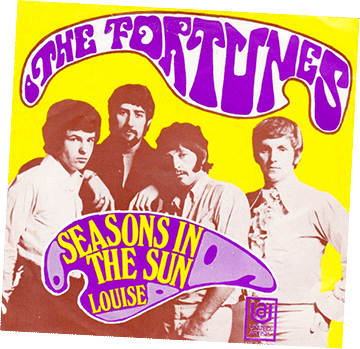
David Carr left the group in August 1968 to go and live in America where he worked in music production. He was eventually replaced in 1970 by keyboard player George McAllister but it seemed to many that The Fortunes career as a hit recording group was behind them.
Ironically however, The Fortunes started to have some success in the USA with the release of a new album in 1970 and their version of songwriter Tony Macaulay's 'That Same Old Feeling' receiving airplay there and entering the American and Canadian charts. This song became a big hit for the British pop act "Pickettywitch" (whose lead vocalist Polly Brown was from Birmingham) with their recording of it charting in the UK at around the same time.
During a 1970 interview Rod Allen said; "We haven't really done too much here in the UK over the last couple of years. Much of our work has been on the continent though now we're best known for our Coca-Cola TV jingles. We nearly broke up last year when things were getting really down but we stuck through it."
"Here it comes again..."
A switch to the Capitol Records label in 1971, saw The Fortunes hooked up once again to hit song writers/producers Greenaway and Cook and one of the results of this renewed partnership was a great new single titled 'Here Comes That Rainy Day Feeling Again' that gained The Fortunes a Number 15 chart placing in the USA and also a hit in Canada.
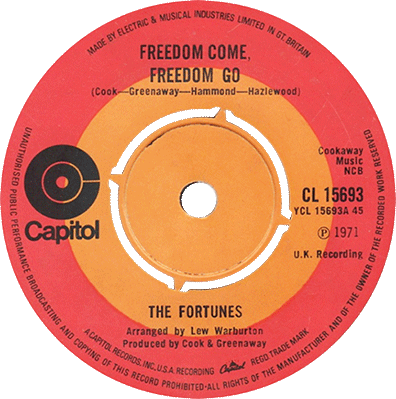
The Fortunes comeback was complete when their next single, the Caribbean-flavored 'Freedom Come, Freedom Go' climbed all the way to Number 6 in the British charts in September 1971 and stayed for a total of 17 weeks - their longest ever UK chart showing. Television appearances on shows like "Top of the Pops" followed.
This success continued a year later with The Fortunes brilliant rendition of 'Storm In A Teacup' written by prolific UK singer/songwriter Lynsey de Paul also making it into the top ten and providing her first major hit composition. Rod Allen said of Lynsey; "She was great. She kept popping into Roger's and Greenaway's office loaded with songs. One day she walked in with 'Storm' and Roger was knocked out."
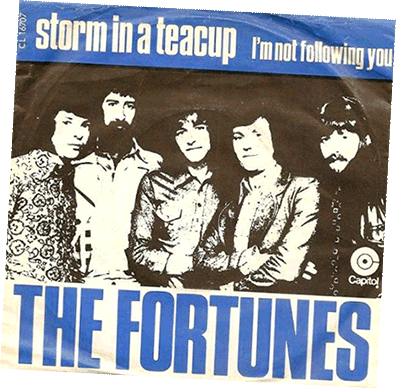
The early 1970s pop music scene in the UK was certainly diverse with a curious mix of heavier music making an impact alongside "singer-songwriters", "glam rock" stars, "blues & soul" performers and "teeny bopper" idols. These included West Midlands artistes like Black Sabbath, Daniel Boone, Slade and Wizzard.
Rod Allen said at the time; "We hope to take our music in a different direction. If our next number is a hit we'll try to stop doing these ultra-commercial numbers. We'd like to do what The Marmalade did when they made 'Reflections' and they were accepted by a much wider audience including America. We want to try and bridge that gap between pop and heavy music. We'll just have to take a chance. We can't go on forever the way we are."
Despite surprisingly having no further chart success in the UK and personnel changes over the next few decades, The Fortunes remained very popular as a major attraction on the club circuit and in 1960s themed nostalgia shows as well as tours to Europe and overseas. Rockin' Berries vocalist Geoff Turton also joined The Fortunes for a while and like some of their contemporaries (for better or worse), the band introduced comedy routines into their shows.
The Fortunes original drummer Andy Brown left the band and the music business in 1977 and reportedly had a job as a postman in Worcester. He can still be found playing drums occasionally in various local line-ups to this day. Shel Macrae also left the band during the 1970s for a career as a solo performer as did George McAllister who joined the Rockin' Berries before the end of the decade.
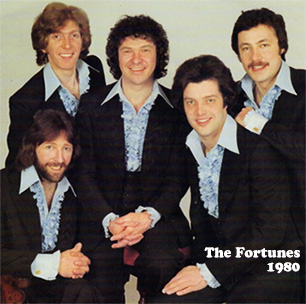
By 1980, the Fortunes line-up had as shown in this photo from left to right; Barry Pritchard, John Trickett (drums), Rod Allen, John Davey (vocal, impressionist), and Rick Persell (guitar,vocal). The group was at this time managed by John Francis.
Barry's brother Dave Pritchard from the Birmingham cabaret group Sight and Sound (and no relation to Dave Pritchard from The Idle Race) was part of The Fortunes line-up but had to leave in 1983 due to ill health. He was replaced by Midlands guitarist/vocalist Michael Smitham who had much experience from years playing in several professional working bands.
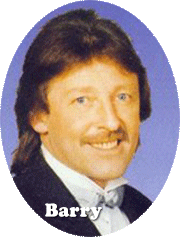
Fortunes founding member vocalist and lead guitarist Barry Pritchard left the group in 1995 due to ill health and went to live in Spain at Costa del Sol where he operated his own restaurant and bar. He died from a heart attack on January 11, 1999 at only 54 years of age.
The Fortunes original keyboard player David Carr passed away in 2011 at age 67 after years of living in America where he performed and toured in the legendary instrumental band "The Ventures". He also worked there as a record producer and played on many sessions - notably for 70's hit pop singer Helen Reddy and Kim Fowley's all-girl band "The Runaways".
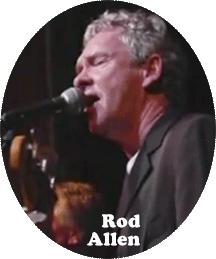
The only remaining original Fortunes member Rod Allen continued to tour and record with the present four man line-up of the band which also included veteran musicians Michael Smitham (guitar/vocals), former "Badfinger" keyboard player & vocalist Bob Jackson, and Paul Hooper (drums).
Despite having previous good health in fronting The Fortunes over five decades, Rod Allen passed away suddenly from cancer in January of 2008 at age 63 leaving the group's future at that time uncertain (see BrumBeat feature on Rod Allen).
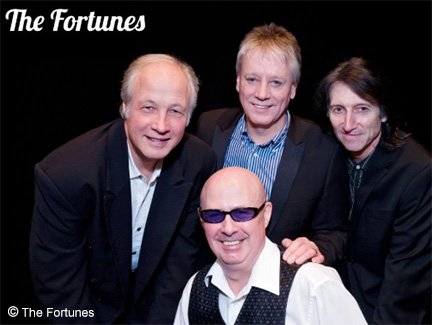
It was Rod Allen's wish that The Fortunes continue to perform after his death so a worthy replacement was selected when "The Dakotas" vocalist/bassist Eddie Mooney from Stoke-On-Trent joined the band. Paul Hooper left the line-up in 2010 with former "Marmalade" drummer Glen Taylor selected as his replacement.
Now, with long-time member Michael Smitham at the helm, The Fortunes continue their tradition of high-quality performances throughout Britain and the rest of the world. Mike and Eddie also perform as a duo under the name "Sounds of The Fortunes". Bob Jackson left the group in 2019 due to ill health and was replaced by veteran keyboardist Chris Hutchison.
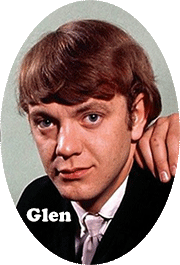
The last surviving Fortunes founding member Glen Dale after his departure from the band in 1966, went on to record some singles for various labels and played the U.K. club circuit during the 1970s. He later moved to Tenerife in the Canary Islands and performed there for many years as a singer at some of the resorts before eventually retiring to Eckington near Sheffield.
Despite ill health, Glen recently went to a Fortunes concert performance and was invited up to sing a few of their early hits with them which he happily did from his wheelchair. His voice that night was still exceptional. Glen Dale passed away on January 13, 2019 aged 79.
Copyright © John R Woodhouse
Sources: 'The Guinness Book of British Hit Singles' 5th edition 1985; 'Where Did You Go My Lovely' book by Fred Dellar 1983; 'Brum Rocked!' and 'Brum Rocked On!' books by Laurie Hornsby 2003; 'The British Invasion' book by Bill Harry 2004.
The Fortunes 1960s Record Releases
(highest UK chart position in brackets)
Singles:
Albums:
Visit the OFFICIAL FORTUNES WEBSITE at: thefortunes.co.uk
Visit THE OFFICIAL FORTUNES FACEBOOK PAGE
Also, check out The Reg Calvert Story by David St. John at: http://www.davidstjohn.co.uk/regcalvert.html
Also, check out The Fortunes Vintage UK Fan Base at: https://www.facebook.com/The.Fortunes.UK.fan.base
If you would like to contribute to this page, please e-mail john@brumbeat.net